- Home
- Various Authors
Legends: Stories in Honor of David Gemmell Page 5
Legends: Stories in Honor of David Gemmell Read online
Page 5
“And what happened?”
There was a peculiar, uneasy shuffling among them. Lapscar lifted his brows. “Well?”
One of his councillors stepped forward, clearing his throat. “It was the healer, Lord.”
“The healer?”
“She…” the councillor, who was nearing seven foot, with tusks almost as fine as Lapscar’s own and the scars of a score of battles marring his hide, bared his teeth. “Are you sure she healed you, Lord?”
“What do you mean?”
“Because she was no ordinary human!” The councillor hissed. “She moved like nothing I have ever seen. Pilsher is still unconscious,” he waved a hand to the soldier lying slack-faced against the wall, “and Molik will be nursing his balls for a month.” Someone – presumably Molik - groaned in agreement.
Lapscar felt something go through him, a strange, clear light. I was named for a little red flower…He walked through them. They eyed him suspiciously, drawing away, fearing his touch. “If any of you still think I am a wraith, I invite you to try a bout with me,” he growled, clenching his fist so the great muscle of his forearm leapt up, quivering. “Otherwise, get to your duties. Gaflan, with me.”
They went up onto the battlements. Lapscar dismissed the guards, though he kept Brug with him. He leaned his elbows on the parapet, and looked out over his lands. The clouds were drawing back, stars bright among the silvery wisps of vapour.
“Gaflan. Have you heard of Bloom of Crimson?”
Gaflan swallowed. When he spoke, his voice was unsteady. “Of course. But your deeds are greater.”
“Rot, boy. My deeds may be spoken of for a generation, perhaps. But even you do not like to hear that name spoken above a whisper, and her deeds will ring in darkness for centuries. Beside them, mine are the tantrums of a child. She was the greatest and most terrible. You know what happened to her?”
“She was…” Gaflan cleared his throat. “She was soul-bladed, I heard.”
“She would have been the most dreadful of wraiths, would she not? But no one ever reported seeing her wraith. Perhaps, like me, she survived…”
“I am glad to see you well.”
“Are you, indeed? Well, you may yet have cause to regret it, boy. Go now.” Lapscar watched his son depart, and grieved for something he could barely name.
“Lord?”
“Yes, Brug.”
“The healer’s gone.”
“Yes.”
Brug wrinkled his snout, and shrugged. “Healing’s still here.”
Lapscar looked at Brug, and smiled, a smile not without pain, but not without pleasure, either. “Yes. Sometimes, boy, you’re sharper than my sons.”
Some days later, Lapscar stood again on his battlements, surveying by moonlight the territory he had spent his life earning.
“You well, Lord?” Brug said.
“In a manner of speaking.” Lapscar threw his head back, and laughed like a cracked bell, sending ravens circling up in the darkness, cawing their displeasure. “Saved and damned at a stroke! Ah, life is a comedy.” He looked away, over the dark land. “I think she was alone, when it happened to her,” he said. “And she fought. She won. The wit to realise how to fight, and the raw and bloody courage to do it! There’s a soul worth fighting for. She left me her name, at least. Perhaps I am a fool.” He smiled to himself. “Oh, certainly I am a fool. But I can hope that she wanted me to find her.”
“My Lord is leaving the keep.”
“The keep will do without me.” He ran his hand over the well-mortared stones, gently; brushed the dust off on his leg. “And I can do without the keep.”
“Me too, then.”
“If you wish. It’ll be a strange life. But I could do with someone to watch my back.”
Brug shifted his huge shoulders. “You always watched mine, Lord. Where we going?”
“Wherever we hear someone has been soul-bladed. I’m changing my profession.”
“No more fighting?”
“Not if I can avoid it. It’s not proper for a healer.” Lapscar laughed again. “‘All any healer needs to know, and a little more than most.’ Damn you, woman. I’ll find you if it takes me the rest of my days.”
“She’s only little. Can’t have got so far, with those little legs.”
Lapscar slapped Brug on the arm. “Let’s hope you’re right,” he said. “We’ll seek the little scarlet flower, and in the meantime, the Wolf of Gaen will try his hand at turning shepherd...”
A short time later, two figures left the keep by a hidden door, walking over the moon-silvered land and into another future.
Return to Arden Falls
A Tale of the Fallen Hero
Ian Whates
“May I buy you a drink?”
There are many questions I might say no to. This isn’t one of them.
The man’s timing was perfect. The Teller had just finished his performance, having spun an amusing yarn about a woodcutter’s daughter and a lecherous Treemeister – those mythical mystical shepherds of the forest said to safeguard the wilds from harm. Utter nonsense, of course, but it made for a good story.
Having returned from the bar with my ale replenished, the stranger then assumed he’d bought my attention as well, claiming the chair opposite and asking, almost as soon as he had settled, “Have you ever been to Arden?”
My heart missed a beat but I managed to stay calm, raising my goblet and swallowing a settling mouthful while wondering whether any innocent-sounding question had ever been less innocent.
Only when the goblet was firmly back on the table did I reply, “Heard of it. There was a battle there once, wasn’t there?”
“Yes, that’s the place; a famous battle. Gerard himself fought there, at Arden Falls just north of the village. It’s a beautiful place, picturesque, you know? To see it now you’d never guess that so many had died there. But, if you take the path from the falls back to the village, you pass this graveyard on your right, where the slain were laid to rest. Massive it is. They say that the dead dug their own graves at the very height of the battle, crawling in and pulling the earth down after them, just to escape the carnage.”
“Really?”
Gods, how I hate these ridiculous legends. Arden Falls had been a grim and bloody affair, no question, but I didn’t recall seeing any corpses leave of their own accord, crawling or otherwise. As for a graveyard… Bollocks. A mass grave more like; a pit into which the bodies were rolled after having been stripped of anything remotely valuable by the village folk and other opportunists.
The question troubling me just then, though, was who the hell this over-amiable fellow might be and how much did he know about me? Okay, that’s two questions but, in mitigation, I had been drinking.
“I saw you fight earlier,” he said.
A public duel, a pit-fight between me and a swordsman with twice my muscle and a tenth my skill, our bout squeezed in between one involving two malnourished ‘Amazons’ armed with knives and token wrist shields and a wrestling contest pitting a broad-chested giant of a man against a bear. The trifle I made by betting on the bear – no way anyone was going to risk a creature that valuable unless they were confident it could win – covered what I’d lost backing the blonde Amazon; I always have been a fool for a pretty face. As for my own duel, my opponent possessed all the characteristics of a former soldier: competent, precise, disciplined… and eminently predictable. I made sure the fight lasted just long enough to entertain the crowd, but the purse on offer wasn’t sufficient to warrant stretching it out any further.
“You’re good with a sword,” my new-found friend told me.
“That I am.”
“I want to hire you, to escort me to Arden.”
Of course he did.
I’m not sure why I said yes – well, the money, obviously – but I’d avoided returning to Arden for all these years, so why the sudden change of heart? I think, on reflection, it was simply the right moment. To bury the ghosts, to say goodbye to
friends and comrades I’d been too numb – both physically and mentally – to make peace with properly at the time.
Perhaps there were other reasons, but if so I prefer not to dwell on those.
Castor – that was how my new employer introduced himself. He was a garrulous bastard, but maybe some of that was simply to compensate for the fact that I wasn’t. The journey to Arden took the best part of three days, during which I learnt pretty much his entire life story, while he learnt next to nothing about me.
Within the first hour of setting out I’d heard that he was originally from a small hamlet just south of Trilmouth. He was the youngest by an hour of twins and one of five children – four boys and a girl – his birth declared a curse and a blessing in equal measure. Twins were a rarity, for both to survive even more so; hence the positive portents. His mother, however, had been less fortunate, drawing her final breath at roughly the same moment he drew his first, which accounted for the ‘curse’ bit. Killing your own mother before you’ve so much as opened your eyes doesn’t augur well in anyone’s book. Personally, I reckon that outweighs ‘oh look, twins; how lucky’ every time, but what do I know?
During the first morning of our time together I also learnt that his father had been a blacksmith, teaching the trade to his sons, that Castor had no memory of one brother, who died in infancy, while his sister had perished of greypox on the cusp of her teens. That left three siblings: Artur, the eldest – who had inherited the smithy from their father – friend Castor, and his older-by-less-than-an-hour twin, Paulus.
Paulus was the problem. There seemed to have been some sort of falling out prompted by Artur’s inheriting the family business, which caused Paulus to strike out on his own, settling in distant Arden. Castor had followed him. He clearly looked up to his older twin, which must have made the lad’s death at the Battle of Arden Falls all the more difficult to take.
“I’d moved on from Arden by then,” he said wistfully, without offering any explanation as to why. “I felt it though, the moment he died.”
Whether you believe in all that rubbish about a special link between twins or not, one thing was becoming increasingly apparent: my employer was delusional. Not a problem – he was hardly the first such I’d worked for, and at least his didn’t seem the dangerous sort.
“I never have been much of a one for the martial arts,” Castor explained as the afternoon wore on. I hadn’t asked; I hadn’t needed to. “A bit of an oaf with a sword, in truth. Ask me to forge one and fine, I can do that, but when it comes to wielding it afterwards…?” He shrugged. “Hence my employing you. These are dangerous times.”
True enough. I’m not sure the roads had ever been safe, but they certainly weren’t these days. Castor had paid me a modest retainer with the promise of a more substantial fee at the job’s completion. He let me know without quite being insulting that he wouldn’t be carrying the monies with him, that they were deposited securely against our safe return. Anyone would think he didn’t trust me or something, which was the first sign of good sense I’d yet seen in the man.
Turned out he hadn’t been to Arden since before the infamous battle, despite his eulogising at our initial meeting, which, it emerged, consisted of embellishments built around memories a decade old and secondhand reports from others. Mind you, my own recollections of Arden were almost as old and by no means as pleasant.
We spent the first night under the stars, but broke our journey on the second at an inn, The Butchered Stag, where Castor encountered some competition on the conversational front, as the landlord insisted on regaling us with the tale of how the inn had acquired its name. To summarise: a horned larder of walking venison had been killed on this very spot.
“A giant, noble beast he was, majestic and fierce,” the landlord insisted. “A prince among stags. His antlers take pride of place here to this very day.”
He pointed to an impressive set of branching bones affixed to the taproom’s longest wall. They did appear to be a little larger than the others mounted there, though not by much. The walls were festooned with the skulls and antlers of unfortunate plant-eaters, so numerous that I wondered how the patrons avoided impaling themselves when the inn got really crowded.
It was later that evening, as the two of us sat in a corner and supped ale together, that Castor dispelled any lingering doubts I might have had regarding his sanity.
“I’ve seen him, you know,” he told me. “Paulus. His spirit comes to me in the depths of the night, begging for my help. He can’t find peace. That’s what this is all about. We have to recover his bones, so that I can bring my brother home and lay him properly to rest.”
The subtle shift from ‘me’ to ‘we’ hadn’t escaped me, but I let that one go, burying it away with my credulity. I asked instead, “And how exactly are you going to do that among so many fallen and buried?”
He smiled with the impregnable certainty of the self-beguiled. “Paulus will guide me, never fear.”
I wasn’t about to. The way I figured it, one bag of bones looks pretty much the same as any other. I had no doubt we’d come back from Arden with somebody’s mortal remains, and if Castor chose to believe they were those of his dear departed brother, all well and good. Just so long as he wasn’t expecting me to do the digging.
“Why wait until now?” I asked – a question I could just as easily have directed at myself.
“Paulus’ spirit has only recently started appearing to me. I’ve no idea why that should be. Perhaps he’s just now learned how to manifest, or maybe the torment of unrest has grown with each passing year, driving him at last to seek aid… At first I tried to ignore him, attributing these visitations to bad dreams, but they persisted, and his beseeching grows ever more desperate. My doubts have been satisfied. This really is Paulus’ tortured shade. I have to help him, so that we both may find peace.”
I kept my own counsel on the subject after that, resigned to whatever the morrow might bring.
In the event, what it brought was an ambush, though not until late in the day. By then we were close to Arden and, after three days in his company, I could happily have strangled my travelling companion. The opportunity to exercise my sword arm came as welcome relief.
Three of them, all mounted. One approached from behind, the other two rode out from a stand of trees directly in front of us: swarthy, grim-faced men, the sort for whom the word ‘desperate’ had been invented. No armour, no helmets: perfect.
The fellow to the left held a bow, mind you, fumbling with it as he attempted to nock an arrow while simultaneously controlling his horse.
I’m a great believer in seizing the initiative, especially when cornered. Without waiting for the would-be archer to get organised, or for anyone to issue whatever challenge they intended, I drew my sword and kicked my horse into a charge.
There’s an art to fighting on horseback; you have to make allowance for the rhythm of your mount, adjusting to its gait and movement without consciously trying to. I’ve heard tell that the plainsmen of distant Yulgetthi are naturals at this, that they sit a horse before they can walk, think nothing of a ten year-old bringing down a desert grouse while riding at a canter, and that by the time they’re twelve many can do a handstand on the back of a galloping steed, just for the hell of it.
Good for them. I, on the other hand, had to work at it. Long hours of sweat, toil, curses, chafed legs, blistered hands and aching limbs, not to mention bruises upon my bruises after being battered by staves, clattered into, and unceremoniously dumped from my saddle time and again.
Try sitting a horse and swinging a sword in anger without some degree of training and you’re liable to end up struggling against your mount’s natural motion rather than working with it. A cut will go too high or too wide, while any attempt at a decent thrust is more likely to unseat you than actually hit anything. Having an experienced horse helps as well, of course.
Not for the first time I had reason to be grateful for the zeal and dedication of my youth,
particularly as the pair facing me gave every indication that they’d barely mastered climbing into a saddle.
My intention was to take them by surprise. Near as I could tell, it worked. Maybe the roar I uttered at the same time helped – I’m not above a touch of theatre when the occasion demands. An arrow zipped past as the panicked archer achieved some semblance of coordination, but it went well wide. I angled towards him on the basis that having fired the bow he wouldn’t have time to defend himself properly. So it proved. I passed him on my right, which brought him in line with my sword arm while simultaneously placing him between me and his companion, hampering the latter.
One blow accounted for the first man, my blade cleaving into his unprotected face while he was still trying to draw his own weapon.
The force of impact nearly wrenched the sword from my hand, but I clung on, urging my mount into as tight and swift a turn as it could manage. Fortunately, that proved much tighter and swifter than my other immediate opponent, who was struggling to control his now panicked horse and turn it to face me. He succeeded well enough to at least muster some token resistance, blocking my first strike.
Not so the second, which slipped past his guard and between his ribs. I pulled the blade free and stabbed him again for good measure, though he was already going down.
My thoughts turned to the third attacker, but he had opted for a tactical withdrawal and was high-tailing it back the way he’d come. That left me with Castor, who still sat in his saddle but looked unusually pale. It was then that I noticed the blood seeping from between his fingers, which were clasped to his left arm just below the shoulder.
“The arrow…” he said quietly.
I cursed blind misfortune and abandoned any thought of going after the surviving brigand. The archer’s shot had been so wild I hadn’t spared it a second thought, but the arrow intended for me had obviously flown on to hit Castor, whom I was being paid to protect. That took a little of the shine off my magnificent victory.

 Lady Ambleforth's Afternoon Adventure by Ann Lethbridge, Barbara Monajem, Annie Burrows, Elaine Golden, Julia Justiss and Louise Allen
Lady Ambleforth's Afternoon Adventure by Ann Lethbridge, Barbara Monajem, Annie Burrows, Elaine Golden, Julia Justiss and Louise Allen Gods & Mortals
Gods & Mortals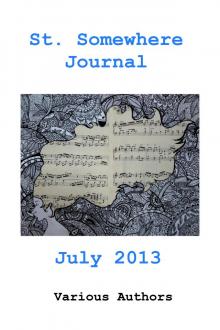 St. Somewhere Journal, July 2013
St. Somewhere Journal, July 2013 firstwriter.com First Short Story Anthology
firstwriter.com First Short Story Anthology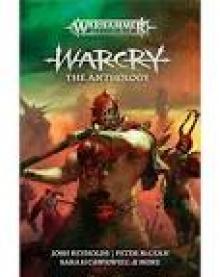 Warcry: The Anthology
Warcry: The Anthology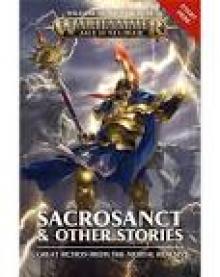 Sacrosanct & Other Stories
Sacrosanct & Other Stories Ultimate Heroes Collection
Ultimate Heroes Collection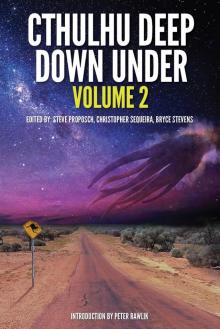 Cthulhu Deep Down Under Volume 2
Cthulhu Deep Down Under Volume 2 Erotic Classics II
Erotic Classics II Dynasties: The Elliotts, Books 1-6
Dynasties: The Elliotts, Books 1-6 Dynasties:The Elliots, Books 7-12
Dynasties:The Elliots, Books 7-12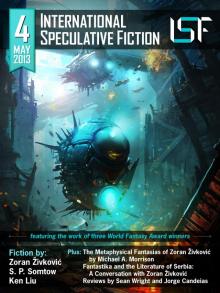 International Speculative Fiction #4
International Speculative Fiction #4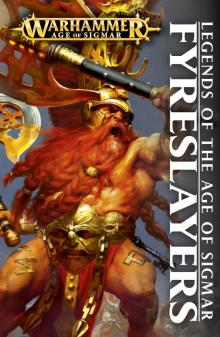 Fyreslayers
Fyreslayers One Night In Collection
One Night In Collection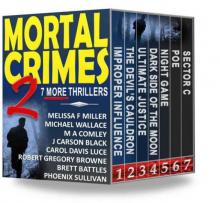 Mortal Crimes 2
Mortal Crimes 2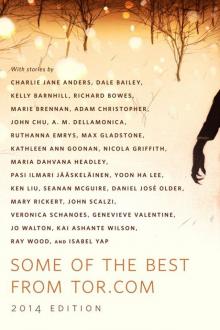 Some of the Best from Tor.com
Some of the Best from Tor.com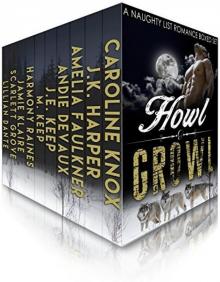 Howl & Growl: A Paranormal Romance Boxed Set
Howl & Growl: A Paranormal Romance Boxed Set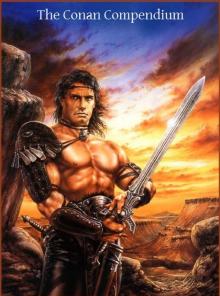 The Conan Compendium
The Conan Compendium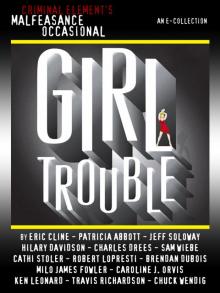 The Malfeasance Occasional
The Malfeasance Occasional Brides of Penhally Bay - Vol 4
Brides of Penhally Bay - Vol 4 Brides of Penhally Bay - Vol 2
Brides of Penhally Bay - Vol 2 Brides of Penhally Bay - Vol 1
Brides of Penhally Bay - Vol 1 School's in Session
School's in Session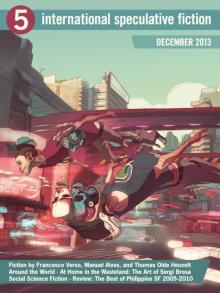 International Speculative Fiction #5
International Speculative Fiction #5 Erotic Classics I
Erotic Classics I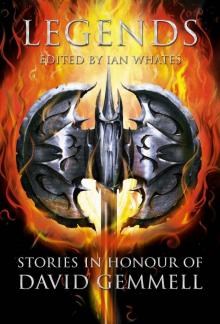 Legends: Stories in Honor of David Gemmell
Legends: Stories in Honor of David Gemmell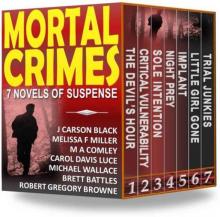 Mortal Crimes 1
Mortal Crimes 1 The Classic Children's Literature Collection: 39 Classic Novels
The Classic Children's Literature Collection: 39 Classic Novels Don't Read in the Closet volume one
Don't Read in the Closet volume one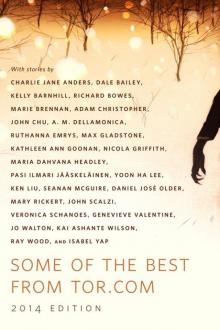 Some of the Best from Tor.com: 2014: A Tor.Com Original
Some of the Best from Tor.com: 2014: A Tor.Com Original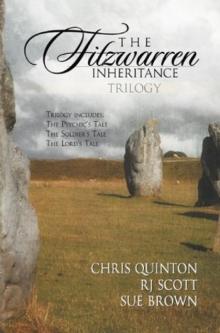 The Fitzwarren Inheritance
The Fitzwarren Inheritance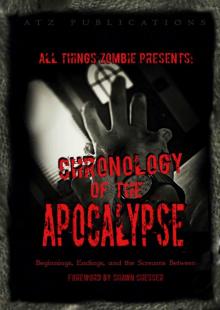 All Things Zombie: Chronology of the Apocalypse
All Things Zombie: Chronology of the Apocalypse Hammer and Bolter - Issue 12
Hammer and Bolter - Issue 12 Kiss Kiss
Kiss Kiss Dog Stories
Dog Stories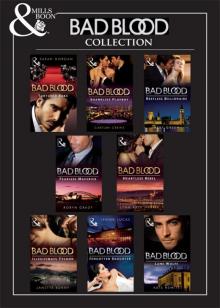 Bad Blood Collection
Bad Blood Collection